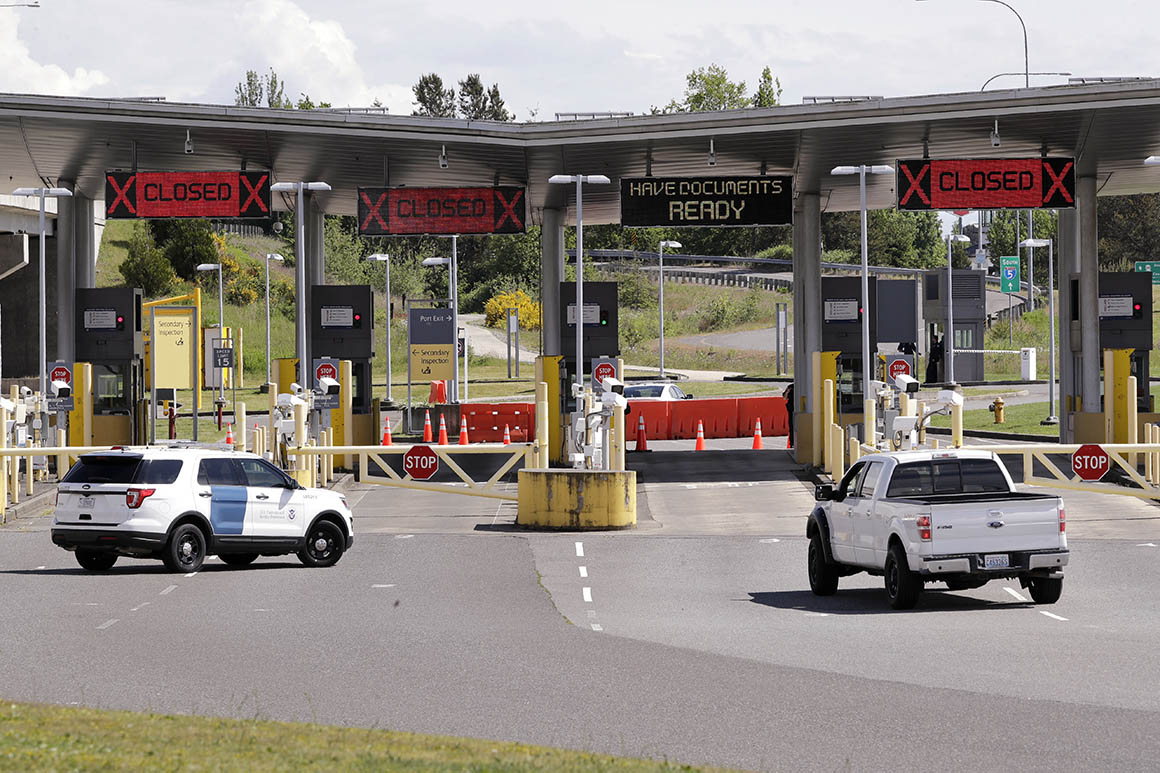Canadian and U.S. governments must decide before June 22 whether to extend, amend or end land border restrictions — a Covid-19 response that is splitting families, disrupting tourism and upending life in border towns.
Even with its provinces reopening, Canada is expected to push for maintaining restrictions on cross-border travel to all but essential travel. Prime Minister Justin Trudeau announced Monday that border officials will begin admitting immediate family members of Canadian citizens and permanent residents — but those travelers will be required to observe a 14-day quarantine, and thus must be able to stay in Canada for at least 15 days.
Ottawa’s response comes after reports of spouses being separated, including stories of partners afraid of missing the birth of a child. Some families have had to be creative, meeting in places where little but a ditch divides the nations.
Even with Canada’s easing of family separation, the decision by the two countries, which share the largest nonmilitarized land border in the world, will set the course for the coming months. The border’s closure has had limited effects on trade, but it affects workers who live in one country and have employment in the other and has ground tourism to a halt.
At the provincial and state Peace Arch parks that straddle the B.C.-Washington state border, families separated by restrictions have reached across boundaries to hug, social distancing be damned.
The change “does not mean the border will now be open to weekend travelers,” Immigration Minister Marco Mendicino cautioned Monday.
Spokespeople from CBP and the White House did not comment on whether that policy would be reciprocated at the land border. Immigration attorneys say Canadians who fly to the U.S. have been able to enter the country easily.
The border has been closed by mutual agreement since March 21 in a bid to slow the spread of the coronavirus.
Democratic Rep. Brian Higgins, who represents Buffalo and Niagara Falls, N.Y., has called on Canada and the U.S. to expand the list of who may cross the border to include individuals who “travel safely to visit family,” cross to manage “legitimate business interests” and travel to check on personal property.
“I think there’s been a great demonstration of both the United States and Canadian population to recognize that, with no treatment, with no vaccine, it’s going to require the discipline of individuals to ensure that we can ensure the cross-border movement of people and commerce in a way that is responsible and safe,” he said in an interview.
Quarantine for those individuals should “not necessarily be a mandate,” Higgins said before Trudeau’s announcement, as long as they’re practicing proper hand hygiene, maintaining social distance and wearing face masks. But he admitted there’s no way for travelers or for border officers to certify that someone trying to cross the border regularly takes those precautions and represents a low risk of spreading the virus.
“In order to keep yourself and others safe, you have to take personal responsibility, and I think that’s what we require,” Higgins said.
Several federal and provincial Canadian officials have signaled support for family reunification across the border. That includes Ontario Premier Doug Ford, who’s shed his pugilistic, Trump-like reputation as he’s managed a prolonged outbreak in the province with the advice of public health officials and while showing empathy for the sick. However, he said, opening the border further will require greater levels of screening.
“We really, really have to ramp up screening” when the border eventually reopens, Ford said during a press conference last month. “Meaning, no one gets through this border without screening, and if they show symptoms, they get tested, and then they self-isolate and track them down to make sure they’re self-isolating.”
Alberta Premier Jason Kenney has even implemented additional screening measures for international travelers entering the province, including from the land border, after criticizing Ottawa’s early screening protocols.
The U.S. has more than 1.9 million Covid-19 cases and more than 110,000 deaths as of Monday. Meanwhile, Canada has recorded 95,699 confirmed cases and 7,800 deaths as of Sunday. Chief Public Health Officer Theresa Tam said Monday cases continue to decline, even in hard-hit provinces like Ontario and Quebec.
Even as caseloads go down, B.C. Health Minister Adrian Dix said the time is not close to being right for reopening the border, beyond adding exceptions for families. “I think the evidence is that Canadians for the moment should not be visiting the United States on visitors trips, and that Americans shouldn’t be visiting Canada,” he said.
Dix also said he thinks quarantine requirements will need to be “in place for some time,” though he couldn’t estimate for how long.
Where government officials and local residents stand on what comes next depends a lot on where they sit on the border and on how their region is handling the coronavirus pandemic. Current limitations are a source of consternation among residents of one country who own property in another. Tourist towns — normally busy with shoppers and cross-border visitors at the start of the season — are empty.
“The busiest months at the border are June, July and August,” said Rosanna Berardi, an immigration attorney in Buffalo, N.Y., where many locals cross to spend summers in Canada’s “cottage country” — where they own homes.
Communities in Whatcom County, Wash., are hurting for the sales tax revenue Canadians pump into their coffers by crossing for cheaper gas and groceries, said Don Goldberg, director of economic development at the Port of Bellingham, Wash. The daily passenger vehicle volume was down 98.5 percent on Sunday from the same day in 2019, according to data compiled by the Whatcom Council of Governments.
Still, Goldberg said there’s a recognition that, should strictures loosen too quickly and an outbreak occur, that could further devastate the economy.
While local officials want to see the border reopen to salve the economy, Goldberg said, “we also realize that we have to do this in a way that protects the citizens of both countries, and that we don’t create a hazardous situation that closes the border down again.”
Christopher Sands, director of the Wilson Center’s Canada Institute, said Canada and the U.S. should jointly tackle the personal travel issue, noting that neighboring island nations New Zealand and Australia, each of which has or is on track to eliminate the disease from its border, have agreed to develop a tourism “bubble.”
Ottawa and Washington should consider widening the scope of what’s essential, while making it easier to understand when travel is permitted, he said. Building on an existing trusted traveler platform like Global Entry and including testing data could be one way to approach cross-border travel in the Covid-19 era, he said.
A regional approach to border management — for example, permitting more crossings in an area with favorable epidemiology while maintaining restrictions where caseloads remain high — appears improbable. The 5,525-mile-long boundary is managed federally, and a patchwork system could inspire travelers from Covid hot spots to drive out of their way to cross at sanctioned ports.
Indeed, a large share of the Covid-19 strains identified in British Columbia originated from Washington State, though the vast majority are strains with footprints in Europe and Eastern Canada, according to a June 4 presentation by the B.C. Ministry of Health.
“I think it’s fair to say that that profound relationship between Canada and the United States was a significant part of early transmission,” Dix said.
Canada and the U.S. must think creatively about how to let certain populations cross the border while continuing to manage risk, as both countries do every day when waving people through, Sands said. “If we can’t come up with something like that, then we’re going to extend the economic damage that the quarantine has had.”



















